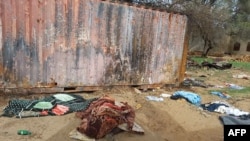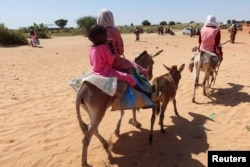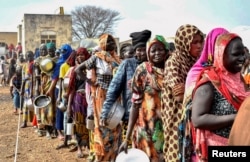A senior U.N. refugee official Tuesday warned that "an unimaginable humanitarian crisis" was unfolding in Sudan, with millions of people being forcibly displaced from their homes by an increasingly vicious conflict.
"What I saw was despair, was unimaginable humanitarian needs and fear in so many people's eyes," said Dominique Hyde, UNHCR Director of External Relations. "This is a war that erupted without warning and turned previously peaceful Sudanese homes into cemeteries."
Hyde has just returned from a week-long visit to Sudan's White Nile State as well as border and other areas in South Sudan. She said the fighting was growing in scope and brutality while the world remained "scandalously silent, though violations of international humanitarian law persist with impunity."
Since fighting erupted April 15 between the Sudanese Armed Forces and the paramilitary Rapid Support Forces, the UNHCR reports 4.5 million people have been displaced inside Sudan, while 1.2 million have fled to neighboring countries, including Chad, Egypt, South Sudan, Ethiopia, and the Central African Republic.
Recent fighting in Sudan's Darfur region has caused even more displacement, with thousands of people struggling to find shelter and many sleeping under trees by the roadside, said Hyde, adding that most of the refugees are women and children.
"We are very concerned about them not having access to food, shelter, clean drinking water or other basic essentials," she said.
"It is shameful the atrocities that were committed 20 years ago in Darfur can still be happening again today with such little attention," she added, referring to shocking accounts of widespread rape and sexual violence in Darfur, Khartoum, and other parts of Sudan.
"The U.N. calls for an immediate end to all gender-based violence, including sexual violence as a tactic of war to terrorize people," said Hyde. "There must be accountability for these crimes, as well as medical and psychosocial support for survivors. The parties must put in place mechanisms to prevent recurrence of such violence."
But that is hard to do without money, the U.N official said, explaining that only 39% of the $1 billion needed to provide humanitarian assistance for Sudanese refugees in five countries has been received, and that only one third of a separate $2.6 billion appeal to help 18.1 million people inside Sudan has been funded.
The funding shortage is harming humanitarian operations both inside and outside Sudan. When Hyde visited Sudan's White Nile State last week, she said she saw how the surge of people displaced by the fighting had overwhelmed essential services in the camps.
"Like in the rest of Sudan, schools have been shut for the last seven months as displaced people find temporary shelter inside the classrooms. The health situation is disastrous," she said. "More than 1,200 children under five have died in White Nile State between mid-May and mid-September alone, due to a measles outbreak combined with high levels of malnutrition.
"Thanks to MSF, to UNICEF, to WHO, and UNHCR, we have been able to curb somewhat these deaths. We are now at five a week but still unacceptable in 2023."
The World Food Program reports intensifying conflict in Sudan is forcing more and more people to flee, plunging the economy deeper into crisis, and "pushing hunger to record levels with over 20 million people now facing severe hunger." Among them are some 2.5 million malnourished children, including 700,000 suffering from severe acute malnutrition, which can lead to death.
WFP warns the climate crisis is driving malnutrition to unprecedented levels in South Sudan, with more than 1.6 million children under age five expected to suffer from this condition in 2024.
Hyde said in the week she was in the border area, she saw an estimated 20,000 people crossing into South Sudan from Sudan, which was an "incredible increase" from the previous weeks. She said most of the people were Sudanese refugees, not South Sudanese returning home from years of exile in Sudan.
"In the first months what we were seeing was a large number of South Sudanese returnees going into South Sudan, but that has flipped," she said. "And I think the week I was there, we were at 70 to 80% of Sudanese coming and crossing that border."
Because of underfunding, she said, UNHCR and partners are not able to create a new transit center to accommodate this huge flow of people into the country, nor can they build appropriate water and sanitation centers to prevent possible outbreaks of diseases, nor provide adequate medical services.
At the end of each year, she said, U.N. officials are usually hopeful of receiving any remaining funds left over for such an emergency.
But, she added, "because of what is happening in Gaza … the funds that were intended or that could have gone to Africa or Afghanistan or to any of the many other humanitarian crises" are now being redirected to the Middle East.






